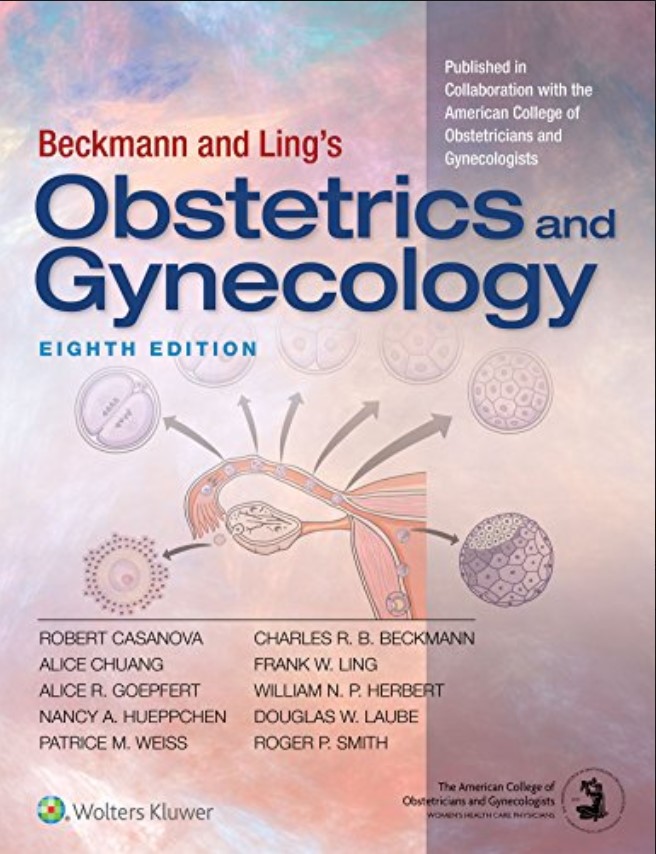Test bank for Beckmann and Ling’s Obstetrics and Gynecology 8th Edition By Casanova
Chapter 1: Women’s Health Examination and Women’s Health Care
Management
1:
Elevating the head of the examining table approximately 30 degrees facilitates
a:
the observation of the patient’s responses
b:
the ability of the patient to comfortably look around to distract her from the examination
c:
the contraction of the abdominal wall muscle groups, making the examination easier
d:
comfortable blood pressure measurement
e:
the physician not being distracted by eye contact with the patient
2:
Which of the following uterine positions is most associated with dyspareunia?
a:
Mid position, retroflexed
b:
Retroverted, anteflexed
c:
Anteverted, anteflexed
d:
Retroverted, retroflexed
e:
Midpostion, anteflexed
3:
Inquiry concerning adult and child history of sexual abuse should be included in the sexual history
a:
if time permits
b:
in visits where there are suspicious physical findings but not otherwise
c:
in visits where sufficient time is allotted
d:
in all new patient visits
e:
in visits where a specific indication is noted
4:
Peau d’orange change in the breast is associated with
a:
edema of the lymphatics
b:
jaundice
c:
too vigorous breastfeeding
d:
overly tight undergarments
e:
galactorrhea
5:
Which kind ofspeculum is often most suitable for examination of the nulliparous patient?
a:
Morgan’sspeculum
b:
Endoscopic speculum
c:
Ling speculum
d:
Graves speculum
e:
Pederson speculum
6:
Which uterine configuration is most difficult to assessfor size,shape, configuration, and mobility?
a:
Midposition
b:
Anteverted
c:
a:
9 months
b:
36 months
c:
12 months
d:
18 months
There is no difference in difficulty
d:
Retroverted
7:
Which type of speculum is most appropriate for the examination of a parous menstrual woman?
a:
Ling speculum
b:
Graves speculum
c:
Pederson speculum
d:
Endoscopic speculum
e:
Morgan’s speculum
8:
Menopause is defined as the cessation of menses for greater than
a:
all the time
b:
almost never
c:
about one-half of the time
d:
about thee-quarters/most of the time
e:
24 months
9:
In a woman describing sufficiently frequent sexual encounters, infertility typically is described as a
failure to conceive after
a:
3 months
b:
9 months
c:
12 months
d:
18 months
e:
6 months
10:
During bimanual examination of the adnexa in normal premenopausal women, the ovaries are palpable
a:
Palpation is done first
b:
Palpation and inspection are done simultaneously
c:
Palpation is only done if inspection is abnormal
d:
Palpation may be done with detailed inspection if a woman is especially modest
e:
about one-quarter of the time
11:
If a patient becomes uncomfortable with a topic during a history-taking session, the best response of the
physician is to
a:
address the patient’s discomfort in a positive and supportive manner
b:
discontinue discussion of the topic to avoid further patient discomfort
c:
discontinue discussion to avoid damage to the patient-physician relationship
d:
continue after making a joke to relieve tension
e:
ignore the discomfort and proceed with questioning
12:
Which of the following statements about the steps in the breast examination is correct?
a:
first day of the last normal period
b:
last day of the last normal period
c:
first day of the last bleeding episode
d:
last day of the last bleeding episode
e:
Inspection is done first
13:
Questions that promote the physician’s fullest understanding of the patient’ssituation are best
characterized as
a:
compassionate
b:
chronological
c:
sympathetic
d:
emphatic
e:
evidence based
14:
The last menstrual period is dated from the
In the abbreviation of the obstetric history-G[1] P[2] [3] [4] [5]-“2” stands for the number of
15:
The passage of clots during menstruation
a:
is always abnormal
b:
may be either normal or abnormal
c:
is always normal
d:
is extremely rare
16:
In the abbreviation of the obstetric history-G[1] P[2] [3] [4] [5]-“1” stands for the number of
a:
living children
b: pregnancies
c:
term pregnancies
d:
preterm pregnancies
e:
abortions
17:
In the abbreviation of the obstetric history-G[1] P[2] [3] [4] [5]-“4” stands for the number of
https://studentmagic.indiemade.com/
a:
living children
b:
pregnancies
c:
term pregnancies
d:
preterm pregnancies
e:
abortions
18:
In the abbreviation of the obstetric history-G[1] P[2] [3] [4] [5]-“3” stands for the number of
a:
living children
b: pregnancies
c:
term pregnancies
d:
preterm pregnancies
e:
abortions
19:
a:
a:
living children
b:
pregnancies
c:
term pregnancies
d:
preterm pregnancies
e:
abortions
20:
In the abbreviation of the obstetric history-G[1] P[2] [3] [4] [5]-“5” stands for the number of
a:
living children
b:
pregnancies
c:
term pregnancies
d:
preterm pregnancies
e:
abortions
21:
Tanner’s classification with respect to the breast relates to changesin the breast
a:
before and after lactation
b:
associated with malignancy
c:
associated with maturation
d:
associated with galactorrhea
e:
associated with fibrocystic changes
22:
The rectovaginal examination should be performed
a:
after 52 years of age
b:
at the initial patient visit
c:
only for the evaluation of chronic pelvic pain
d:
only when there are symptoms of pelvic relaxation
e:
at intervals of 5 years
23:
In the gynecologic history, it is often possible to distinguish between vaginitis and pelvic inflammatory
disease by inquiring about
the duration of the pain
b:
the symptoms present (fever/chills, itching)
c:
the timing of pain in relation to menses
d:
the association of pain with body position
e:
the use of topical medications
24:
The most common reason for failure to visualize the cervix during the speculum examination is
a:
failure to use lubricant
b:
a full bladder
c:
failure to fully insert the speculum
d:
use of a speculum that has not been warmed
e:
use of the wrong speculum
25:
Prehypertension is defined as a blood pressure range of
a:
80-90/120-139
b:
90-100/120-139
c:
80-90/110-129
d:
70-80/110-129
e:
70-80/120-139
ANS: 1-25. [A, D, D, A, E, D, B, C,C,C,A,E,D,A,B,B,C,D,E,A,C,B,E,C,A]




